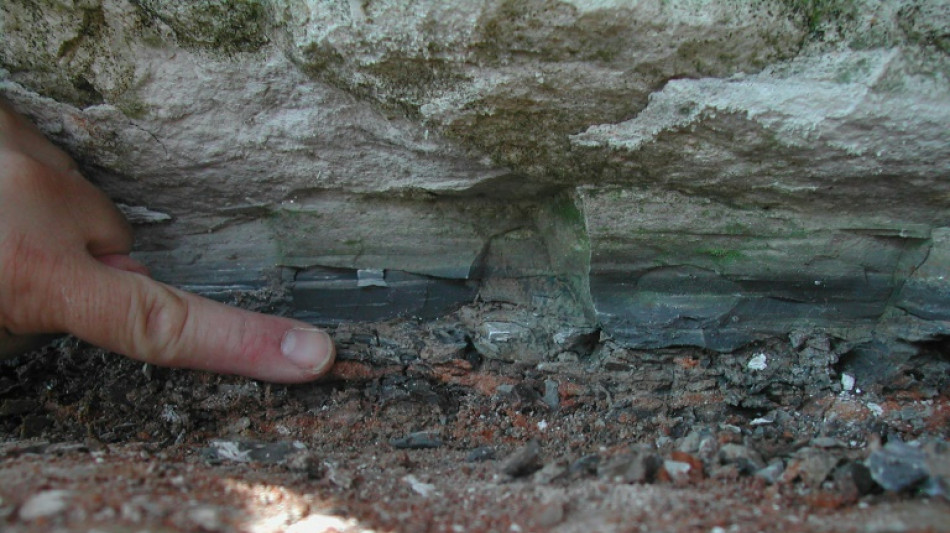
-
 BBC says will fight Trump's $10 bn defamation lawsuit
BBC says will fight Trump's $10 bn defamation lawsuit
-
Stocks retreat ahead of US jobs, oil drops on Ukraine hopes

-
 Suicide bomber kills five soldiers in northeast Nigeria: sources
Suicide bomber kills five soldiers in northeast Nigeria: sources
-
EU set to drop 2035 combustion-engine ban to boost car industry
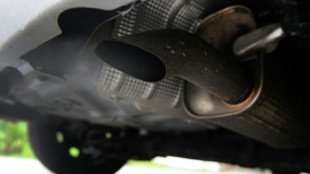
-
 Australia's Green sold for record 252 mn rupees in IPL auction
Australia's Green sold for record 252 mn rupees in IPL auction
-
Elusive December sun leaves Stockholm in the dark

-
 Brendan Rodgers joins Saudi club Al Qadsiah
Brendan Rodgers joins Saudi club Al Qadsiah
-
Thailand says Cambodia must announce ceasefire 'first' to stop fighting

-
 M23 militia says to pull out of key DR Congo city at US's request
M23 militia says to pull out of key DR Congo city at US's request
-
Thousands of glaciers to melt each year by mid-century: study
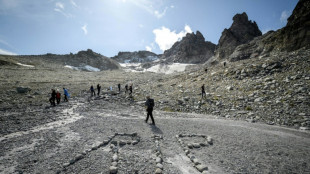
-
 China to impose anti-dumping duties on EU pork for five years
China to impose anti-dumping duties on EU pork for five years
-
Nepal starts tiger census to track recovery
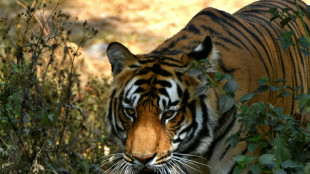
-
 Economic losses from natural disasters down by a third in 2025: Swiss Re
Economic losses from natural disasters down by a third in 2025: Swiss Re
-
Indonesians reeling from flood devastation plea for global help

-
 Timeline: How the Bondi Beach mass shooting unfolded
Timeline: How the Bondi Beach mass shooting unfolded
-
On the campaign trail in a tug-of-war Myanmar town

-
 Bondi Beach suspect visited Philippines on Indian passport
Bondi Beach suspect visited Philippines on Indian passport
-
Kenyan girls still afflicted by genital mutilation years after ban
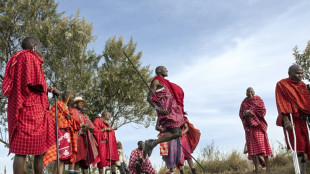
-
 Djokovic to warm up for Australian Open in Adelaide
Djokovic to warm up for Australian Open in Adelaide
-
Man bailed for fire protest on track at Hong Kong's richest horse race

-
 Men's ATP tennis to apply extreme heat rule from 2026
Men's ATP tennis to apply extreme heat rule from 2026
-
Cunningham leads Pistons past Celtics, Nuggets outlast Rockets

-
 10-year-old girl, Holocaust survivors among Bondi Beach dead
10-year-old girl, Holocaust survivors among Bondi Beach dead
-
Steelers edge towards NFL playoffs as Dolphins eliminated

-
 Australian PM says 'Islamic State ideology' drove Bondi Beach gunmen
Australian PM says 'Islamic State ideology' drove Bondi Beach gunmen
-
Canada plow-maker can't clear path through Trump tariffs

-
 Bank of Japan expected to hike rates to 30-year high
Bank of Japan expected to hike rates to 30-year high
-
Cunningham leads Pistons past Celtics

-
 Stokes tells England to 'show a bit of dog' in must-win Adelaide Test
Stokes tells England to 'show a bit of dog' in must-win Adelaide Test
-
EU to unveil plan to tackle housing crisis

-
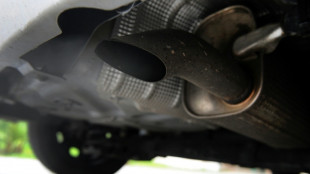 EU set to scrap 2035 combustion-engine ban in car industry boost
EU set to scrap 2035 combustion-engine ban in car industry boost
-
Australian PM visits Bondi Beach hero in hospital

-
 'Easiest scam in the world': Musicians sound alarm over AI impersonators
'Easiest scam in the world': Musicians sound alarm over AI impersonators
-
'Waiting to die': the dirty business of recycling in Vietnam

-
 Asian markets retreat ahead of US jobs as tech worries weigh
Asian markets retreat ahead of US jobs as tech worries weigh
-
Security beefed up for Ashes Adelaide Test after Bondi shooting

-
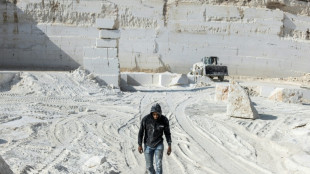 Famed Jerusalem stone still sells despite West Bank economic woes
Famed Jerusalem stone still sells despite West Bank economic woes
-
Trump sues BBC for $10 billion over documentary speech edit

-
 Chile follows Latin American neighbors in lurching right
Chile follows Latin American neighbors in lurching right
-
Will OpenAI be the next tech giant or next Netscape?

-
 Khawaja left out as Australia's Cummins, Lyon back for 3rd Ashes Test
Khawaja left out as Australia's Cummins, Lyon back for 3rd Ashes Test
-
Australia PM says 'Islamic State ideology' drove Bondi Beach shooters

-
 Scheffler wins fourth straight PGA Tour Player of the Year
Scheffler wins fourth straight PGA Tour Player of the Year
-
Tax1099 expands its E-Filing Suite with the launch of 990 series for Nonprofits

-
 How to Choose the Best Plastic Surgeon in Tampa, FL: Gruber Plastic Surgery Releases Patient Safety Checklist
How to Choose the Best Plastic Surgeon in Tampa, FL: Gruber Plastic Surgery Releases Patient Safety Checklist
-
EMCORE Environmental Test Services Officially Launches in Budd Lake, New Jersey

-
 Silver Wolf Completes Acquisition of the Ana Maria Project
Silver Wolf Completes Acquisition of the Ana Maria Project
-
Anew Climate Announces Acquisition of P6 Technologies' Carbon Intensity Platform

-
 Abasca Resources Provides Exploration Update at its Loki Flake Graphite Deposit and Granting Stock Option
Abasca Resources Provides Exploration Update at its Loki Flake Graphite Deposit and Granting Stock Option
-
The U.S. Polo Assn. Palm Beaches Marathon Celebrates Record-Breaking Weekend in West Palm Beach, Florida


Scientists pinpoint dino-killing asteroid's origin: past Jupiter
An intense debate surrounding the cosmic rock that killed the dinosaurs has stirred scientists for decades, but a new study has revealed some important -- and far-out -- data about the impactor's origin story.
Researchers, whose findings were published Thursday in the journal Science, used an innovative technique to demonstrate that the apocalyptic culprit which slammed into the Earth's surface 66 million years ago, causing the most recent mass extinction, had formed beyond Jupiter's orbit.
They also refute the idea that it was a comet.
The new insights into the apparent asteroid that cratered into Chicxulub, in what is present-day Mexico's Yucatan Peninsula, could improve the understanding of celestial objects that have struck our planet.
"Now we can, with all this knowledge... say that this asteroid initially formed beyond Jupiter," Mario Fischer-Godde, lead author of the study and a geochemist at the University of Cologne, told AFP.
The conclusions are particularly notable, given how rarely this type of asteroid collides with Earth.
Such information may well prove useful in assessing future threats, or determining how water arrived on this planet, Fischer-Godde said.
- Samples -
The new findings are based on analysis of sediment samples formed at the period between the Cretaceous and Paleogene eras, the time of the asteroid's cataclysmic impact.
Researchers measured the isotopes of the element ruthenium, not uncommon on asteroids but extremely rare on Earth. So by inspecting the deposits in multiple geological layers that mark the debris from the impact at Chicxulub, they could be sure that the ruthenium studied came "100 percent from this asteroid."
"Our lab in Cologne is one of the rare labs that can do these measurements," and it was the first time such study techniques were used on impact debris layers, Fischer-Godde said.
Ruthenium isotopes can be used to distinguish between the two main groups of asteroids: C-type, or carbonaceous, asteroids that formed in the outer solar system, and S-type silicate asteroids from the inner solar system, nearer the sun.
The study affirms that the asteroid that triggered a mega-earthquake, precipitated a global winter and wiped out the dinosaurs and most other life, was a C-type asteroid that formed beyond Jupiter.
Studies from two decades ago had already made such an assumption, but with far less certainty.
The conclusions are striking, because most meteorites -- pieces of asteroids that fall to Earth -- are S-types, Fischer-Godde pointed out.
Does that mean the Chicxulub impactor formed beyond Jupiter and made a beeline for our planet? Not necessarily.
"We cannot be really sure where the asteroid was kind of hiding just before it impacted on Earth," Fischer-Godde said, adding that after its formation, it may have made a stopover in the asteroid belt, located between Mars and Jupiter and where most meteorites originate.
- Not a comet -
The study also dismisses the idea that the destructive impactor was a comet, an amalgam of icy rock from the very edge of the solar system. Such a hypothesis was put forward in a much-publicized study in 2021, based on statistical simulations.
Sample analyses now show that the celestial object was far different in composition from a subset of meteorites which are believed to have been comets in the past. It is therefore "unlikely" the impactor in question was a comet, Fischer-Godde said.
As to the wider usefulness of his findings, the geochemist offered two suggestions.
He believes that more accurately defining the nature of asteroids that have struck Earth since its beginnings some 4.5 billion years ago could help solve the enigma of the origin of our planet's water.
Scientists believe water may have been brought to Earth by asteroids, likely of the C-type like the one that struck 66 million years ago, even though they are less frequent.
Studying past asteroids also allows humanity to prepare for the future, Fischer-Godde said.
"If we find that earlier mass extinction events could also be related to C-type asteroid impacts, then... if there's ever going to be C-type asteroid on an Earth-crossing orbit, we have to be very careful," he said, "because it might be the last one we witness."
D.Moore--AMWN


